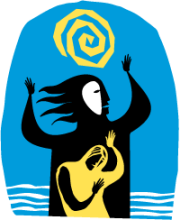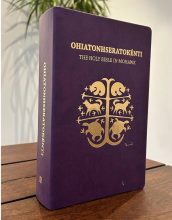The Healing Fund supports healing initiatives for survivors of the residential school system and its ongoing intergenerational impacts.

The Healing Fund, established in 1994, is a grant that supports healing initiatives in Indigenous communities to address the ongoing impacts of the residential school system. Many name a need for mending, restoring, and celebrating—a sense of loss, along with hope for rebuilding identity. Indigenous communities may apply up to $15,000 to create healing, culture, and/or language projects.
Your donations to Mission and Service support the vital work of the Healing Fund.
The Healing Programs Working Group (formerly called the Healing Fund Council), made up of representatives from diverse Indigenous communities across the country, determines the fund's criteria and evaluates applications.
Support for the Healing Fund is movement towards living out the United Church's Apology to Indigenous Peoples (1986) and the Apology to Former Students of United Church Indian Residential Schools and to their Families and Communities (1998). The Healing Fund is made possible by your donations to Mission and Service of The United Church of Canada.
Support the Healing Fund
Please give generously to Mission and Service. If you wish to make a donation directly to the Healing Fund:
Donate online
Donate by mail to:
The United Church of Canada attn. Healing Fund
PO Box 8746, Stn A
Toronto, ON M5W 3C2
Other Ways to Support

Ohiatonhseratokénti: The Holy Bible in Mohawk
This complete translation of the Bible into the Mohawk language is now available through the devotion, knowledge, and artistry of Harvey Satewas Gabriel. Fostered by generations of women in the Gabriel family and the communities of Kanesatake and Kahnawake, this translation was also made possible through the support of the Kanesatake United Church, the Kanesatake Mohawk Council, The United Church of Canada Foundation, and the Canadian Bible Society.
All profits from the sale of the Bible will go to Indigenous language projects, through the Indigenous Church and The United Church of Canada Foundation.
Featured Projects
Gathering to Remember: Creating space for cultural renewal, healing, and deep connection across generations
Healing with Horses: Whether walking beside a horse, brushing its coat, or sitting in circle, each person found space for healing.
Previous Healing Fund projects granted in 2022, 2023, and our current 2024 cycle can be found in the Downloads, below
Funding Criteria
Indigenous applicants may apply with non-Indigenous applicants. We encourage Indigenous and non-Indigenous applicants to follow the principles, norms, and standards of the United Nations Declaration on the Rights of Indigenous Peoples (UNDRIP) as a guide in your work together.
Applications for funding are due March 15 and September 15.
The Healing Fund will not consider applications that are
- from or for the benefit of an individual
- to reduce accumulated capital or operating deficits, or to retire debt
- for general operating costs not linked to a project that meets the fund's granting criteria
- for building projects
- for furniture or capital equipment purchases
- for salaries or wages
- for non-Indigenous churches/ministries
- for education tuition (more information about Waase-Aabin Scholarships for Indigenous students is available below)
Criteria and guidelines for fund disbursement, an application to The Healing Fund, and further background information are available under Downloads, below. For more information, please contact .
An application form and reporting templates are now available for online submissions via Microsoft Forms. We strongly recommend submissions through this new process; however, applications will still be accepted via email, mail, or fax.
The Healing Program's Other Funds
- The Dorothy Jenkins Memorial Fund supports Indigenous ministry personnel and volunteers in leadership development.
- Waase-Aabin Scholarships for Indigenous students:
- The Endowment Fund for Indigenous Post-Secondary Education is for students ages 18 to 29. The annual deadline to apply is March 15.
- The Alvin Dixon Memorial Bursary Fund supports initiatives that focus on education for Indigenous students.
Donations to any of these funds can be made online through The United Church of Canada Foundation.
United Council of Women (UCW) Project
The UCW has committed to gift to the Healing Fund for five years (2023–2028) for healing initiatives focused on Indigenous women, children, and families. Applications submitted to the healing fund with a focus on family-orientated programming will be considered by the Healing Fund Working Group through its Spring and/or Fall discernment. The amount of projects granted funding will be based on the amount of gifts received up until the next application deadline.
UCW Congregations and Members can gift to the specific UCW focused project online or by cheque, with a memo line indicating “NUCW–Healing Fund,” mailed to the address above.
Information about the 2023 UCW project by Regina Urban Native Ministries and current 2024 UCW project by Fort McKay Metis Nation is available in the Downloads, below.
For more information
For more on healing programs, please contact
Downloads
- Healing Fund: Criteria and Guidelines (149.32 KB) (PDF)
- Healing Fund: Application Form (40.19 KB) (Word)
- Healing Fund: Final Report and Budget (41.3 KB) (Word)
- Healing Fund: Interim Report (33.47 KB) (Word)
- Healing Fund Brochure (263.04 KB) (PDF)
- History of the Healing Fund (833.16 KB) (PDF)
- Healing Programs Working Group (242.31 KB) (PDF)
- 2023 Healing Fund Initiatives (188.67 KB) (PDF)
- 2024 Healing Fund Initiatives (125.35 KB) (PDF)
- 2025 Healing Fund Initiatives Summary (138.71 KB) (PDF)
- Healing in the Kitchen UCW Healing Initiative (141.98 KB) (PDF)
- Healing with Horses: Healing Fund and UCW Partnership Spring 2025 (114.8 KB) (PDF)